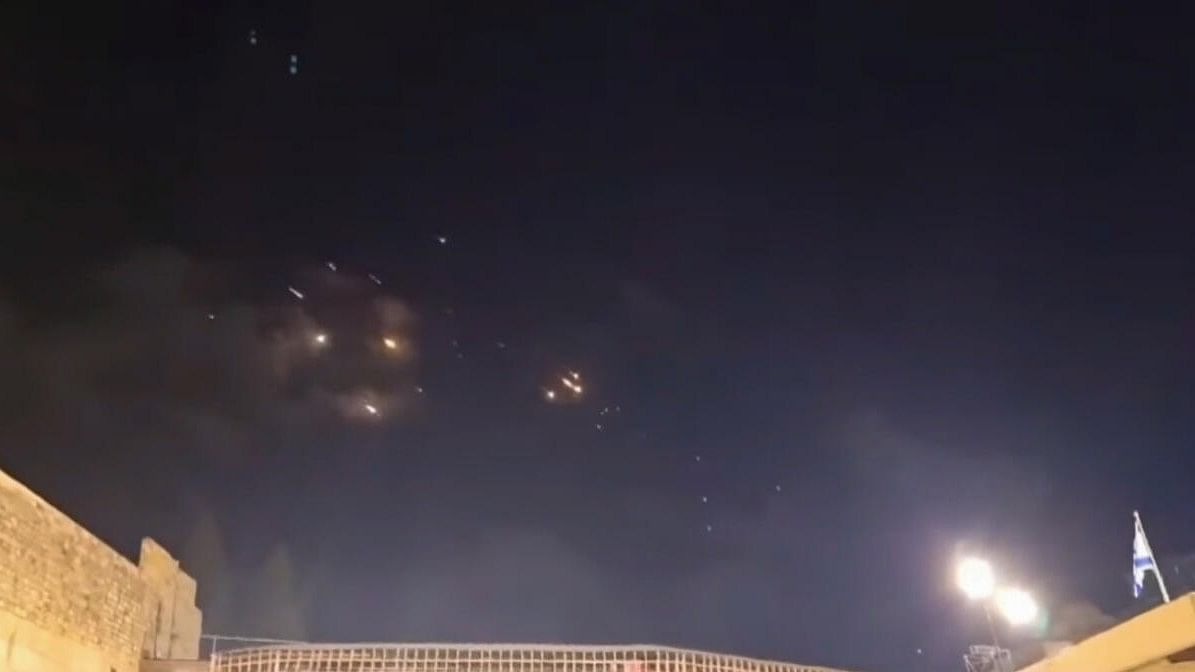
Jerusalem: Missiles that were allegedly fired from Iran, seen heading towards a city in Israel, on Tuesday night, Oct. 1, 2024.
Credit: PTI Photo
New Delhi: With the conflict in West Asia escalating, India on Wednesday called for restraint by all sides even as it advised its citizens to avoid non-essential travels to Iran after the Persian Gulf nation fired a barrage of missiles on Israel to avenge the killing of the leaders of its allies, Hamas and Hezbollah.
New Delhi even asked the citizens of India in Israel to exercise caution, avoid unnecessary travel, and stay close to safety shelters. India had on September 25 also advised its citizens against traveling to Lebanon, the latest scene of the ground offensive by Israel.
India expressed its deep concerns over the escalation of the situation in West Asia and reiterated its call for restraint by all concerned as well as for the protection of civilians.
“It is important (to ensure) that the conflict doesn’t take a wider regional dimension, and we urge that all issues be addressed through dialogue and diplomacy,” Randhir Jaiswal, the spokesperson of the Ministry of External Affairs, said in New Delhi on Wednesday. He added that India was closely monitoring the “recent escalation of the security situation” in West Asia.
A day after Iran fired over 180 missiles targeting Israel, India asked its citizens to avoid all non-essential travel to the Persian Gulf nation. “Those currently residing in Iran are requested to remain vigilant and stay in contact with the Indian embassy in Tehran,” New Delhi stated in its travel advisory issued on Wednesday.
India has about 3000 of its citizens in Lebanon and another 4000 in Iran. Israel has about 25000 citizens from India.
With Israel looking to recruit more skilled blue-collar workers from India, New Delhi, however, did not issue any new advisory to stop the citizens of the country from traveling to the Jewish country in West Asia.
Prime Minister Narendra Modi, himself, too on Monday told his Israeli counterpart Benjamin Netanyahu that it was important to prevent regional escalation.
Modi spoke to Netanyahu over the phone even as Iran vowed revenge after Israeli air strikes killed Hezbollah chief Hassan Nasrallah in Beirut on Saturday, just days after the killing of Ismail Haniyeh. He, however, not only stressed avoiding escalation but also called for the release of all Israeli hostages held by Hamas since October 7 last year.
Modi spoke to Netanyahu just days after he had held a meeting with Palestinian President Mahmoud Abbas on the sideline of a United Nations conclave in New York.
He had conveyed to Abbas his deep concern at the humanitarian crisis unfolding in Gaza and the deteriorating security situation in the region and reaffirmed India’s unwavering support to the people of Palestine, including continued humanitarian assistance. He had reiterated India's time-tested principled position on the Israel-Palestine issue, and called for a ceasefire, release of hostages, and return to the path of dialogue and diplomacy.
